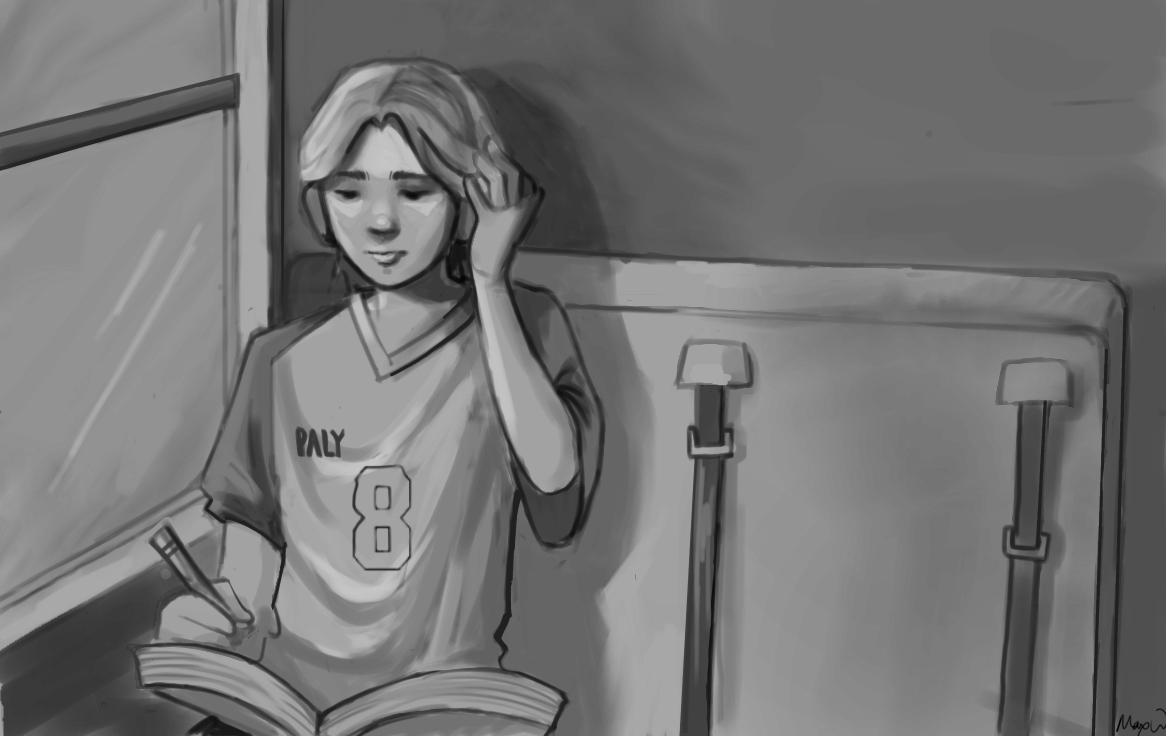It’s Monday, and freshman Henry Chan is flying back from his latest fencing tournament. He’s exhausted after countless hours of sparring, each of his fencing matches wearing down his stamina. All he wants to do is sleep — but he can’t just yet. Resignedly, he opens up Schoology to an endless stream of assignments.
Student-athletes can have a hard time juggling their schoolwork and sport, and Paly doesn’t do much to accommodate out-of-school athletes.
Freshman badminton player Annie Meng said badminton is a huge time commitment on top of homework.
“During the school year, I trained three hours a day,” Meng said. “So that’s anywhere from 20 to 25 hours a week. And then during the summer, it’s more than 40.”
Chan said due to school and fencing practice, his routine afterschool is often crammed and tiring, forcing him to stay up late.
“I usually eat in the car while going to practice, and then afterwards I would eat another small snack,” Chan said. “And then right after, I’d go do homework for two or three hours, and that’ll take me to around like 11 p.m., so I shower and go to bed at midnight.”
Competitions are even more of a time commitment than practice. Junior Varsity cross country runner Max Soprakar said competitions often consume most of his weekend.
“You can’t really study there because you’re always doing something,” Soprakar said. “There were times when I probably could have studied, but then again, I was also doing warm ups.”
With back-to-back competitions, Chan said it’s difficult to catch up on school work.
“Last year, when I was in eighth grade, I had three competitions in March, back to back,” Chan said. “So I was just flooded in homework until the end of March.”
Because of this, Chan said his sport had a negative impact on his grades last year.
“I got a C in math because of it, and I had two English essays that day, and it just went downhill,” Chan said.
Meng said the high school workload is interfering with her sport.
“When I come into training, I’m a lot more tired, and I get more tired easily, but I’m still trying to make it work,” Meng said. “I really don’t want to quit.”
However, sports don’t impact all students equally. Soprakar said missing school for cross-country competitions hasn’t affected his academics too much.
“I missed a few important lessons, but I was able to catch up (on school work) fairly quickly,” Soprakar said.
And junior soccer player Liam Johnson said he is able to keep up with both school and soccer.
“ I think it’s a hard balance, but it’s fun one, and I like doing it,” Johnson said.
When comparing Paly athletes and non-Paly athletes, Chan said the current system favors Paly athletes, who can replace their PE with a prep while their sport is in season.
And Chan said unfortunately out-of-school athletes do not have this option.
“You’re doing more than people who are doing Paly sports, but (without) that extra two, three hours a week just to do homework,” Chan said.
Paly doesn’t hang out-of-school athletes to dry.
These athletes can be excused from physical education by taking Independent Study — an option excusing sophomores, juniors, and seniors who participate in out-of-school sports from PE.
However, Independent Study isn’t available to freshmen. Assistant Principal Jerry Berkson said PE in freshman year gives students a wider variety of physical activities rather than focusing on one set of skills.
“There are certain standards that could be covered freshman year,” Berkson said. “For example, there’s a swimming unit. It’s important to see that kids know how to swim, or could actually survive in the water.”
Meng said opening Independent Study to more student-athletes could help them balance school and sports.
“If I had a prep, I could do my homework, because I also spend a long time on the road to badminton,” Meng said. “But they didn’t allow me to take a prep, because I was a freshman and they offered badminton at school. They just didn’t allow me to do anything.”


